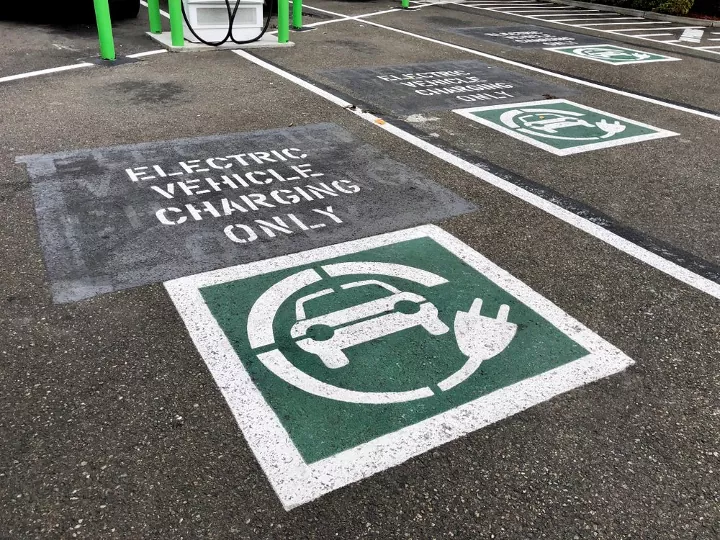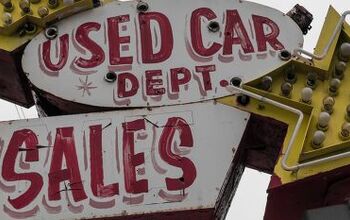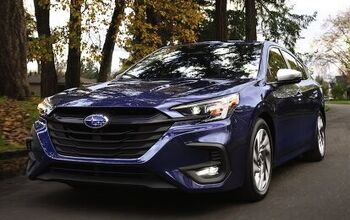Survey Shows Auto Dealers Still Annoyed With Biden EV Strategy

A recent survey, conducted by Automotive News, has indicated that automotive dealerships are still broadly dissatisfied with the Biden administration’s strategy to force the United States to pivot toward all-electric vehicles. According to the 2024 Dealer Outlook Survey, 83 percent of respondents said the government was pushing the transition toward EVs too quickly and mucking up the auto market.
The survey incorporated answers from 208 dealers and dealership managers and the majority agreed that the Biden administration had negatively affected their businesses in 2023. Roughly 55 percent also agreed that having EVs on the lot were actually generating negative interest in the lineup.
"Our roads and electric grid, let alone consumers, just aren't ready as fast as the current administration wants," explained one respondent.
Others likewise said that it should be the market driving EV sales, not pressure from the government.
From Automotive News:
A top concern was the EPA's proposed limits on vehicle tailpipe pollution for 2027-32 model-year cars and light trucks — a regulatory move that, if finalized, could result in battery-electric vehicles making up two-thirds of new-vehicle sales by 2032, according to the agency's projections.
Thousands of dealerships have urged President Joe Biden to reconsider the proposal — which could be finalized as soon as March — arguing it would mandate an unrealistic shift to solely battery-powered vehicles before the market and infrastructure are ready.
"Electric vehicles are exciting. They're definitely overall a good impact for our customers and for the environment, but it's moving too fast," said Michael Lucki, general manager of Riverhead Mazda in New York. "It should be driven by consumer demand, and consumer demand isn't there yet."
The collective dismay was probably best reflected in the question: “Is the Biden administration pushing the industry to move too fast on EVs?”
That query saw an overwhelming majority (83 percent) say yes. Only 8 percent of respondents said no, with 9 percent claiming they were unsure. About half of all dealerships also said they never bothered to register with the IRS to more easily facilitate EV tax credit exchanges. However, about half of those said they at least planned to in the future so customers could get their government refund immediately.
While the Biden administration has a stated goal of seeing half of all new vehicle sales by electric by 2030, it’s technically prohibited from issuing formal mandates requiring what people can use their money to buy. However, it can encourage federal regulators to implement policies so rigid that the industry is required to build EVs in greater numbers and that has been its preferred tactic.
As you undoubtedly know, the automotive sector has spent the last few years patting itself on the back for going along with the scheme and similar programs implemented in Europe. Electric automobiles have, for whatever reason, been framed as a moral good by both industrial and government actors. But the public has remained broadly hesitant to climb aboard the bandwagon as the downsides of EV manufacturing became more apparent.
The industry has likewise had trouble fielding electric vehicles with broad appeal. Luxury-minded electrics are simply too expensive for most people to afford and the more pedestrian models have been seen in the news for battery fires and botched product launches. Some of that is undoubtedly the result of the media landscape trying to draw in eyes. But it’s being reflected in slowing sales, as the electrified segment looks to be approaching market saturation.
That said, sales volumes haven't been great in general and quality control looks to have gone down across the board since 2019. Combustion and electrified vehicles have both seen a drop in consumer satisfaction. Meanwhile, inflationary pressures, caused by excessive government spending and plain-old corporate greed, are forcing average buyers downmarket.
As for dealers, there’s some amount of disagreement as to what’s holding EVs back. Some have argued it’s simply a lack of infrastructure, while others have claimed battery driven vehicles simply don’t work as well for the typical customer. Many stores also don’t want to shell out large sums to refit their facilities in the manner some automakers claim would be mandatory if they want proper EV allocation.
Rising MSRPs were also a concern, with many noting EVs tend to trade at prices far higher than their combustion-driven counterparts and are likewise worse at holding their resale value. That issue was exacerbated by provisions (e.g. Section 30D) issued by the federal government designed to help localize electric vehicle production and ensure wealthy shoppers (who tend to buy more EVs) weren’t being overly advantaged. There are ironically fewer vehicles that actually qualify for government subsidies now than when the U.S. still used production quotas.
"EVs are definitely not a want of our guests today. Who's going to pay that kind of money for that type of vehicle when the infrastructure isn't available?" stated Mike Aus, dealer principal of Durango Motor, which sells Ford, Lincoln, Kia and Toyota vehicles out of Colorado. "Until the prices of them come in line with normalcy, they're going to continue to sit there."
[Image: ZikG/Shutterstock]
Become a TTAC insider. Get the latest news, features, TTAC takes, and everything else that gets to the truth about cars first by subscribing to our newsletter.

A staunch consumer advocate tracking industry trends and regulation. Before joining TTAC, Matt spent a decade working for marketing and research firms based in NYC. Clients included several of the world’s largest automakers, global tire brands, and aftermarket part suppliers. Dissatisfied with the corporate world and resentful of having to wear suits everyday, he pivoted to writing about cars. Since then, that man has become an ardent supporter of the right-to-repair movement, been interviewed on the auto industry by national radio broadcasts, driven more rental cars than anyone ever should, participated in amateur rallying events, and received the requisite minimum training as sanctioned by the SCCA. Handy with a wrench, Matt grew up surrounded by Detroit auto workers and managed to get a pizza delivery job before he was legally eligible. He later found himself driving box trucks through Manhattan, guaranteeing future sympathy for actual truckers. He continues to conduct research pertaining to the automotive sector as an independent contractor and has since moved back to his native Michigan, closer to where the cars are born. A contrarian, Matt claims to prefer understeer — stating that front and all-wheel drive vehicles cater best to his driving style.
More by Matt Posky
Latest Car Reviews
Read moreLatest Product Reviews
Read moreRecent Comments
- SCE to AUX "Unfortunately, this has left many with product lineups overloaded with models loads of households can no longer afford."So what - as long as enough households can afford them, the mfrs don't need to care if everyone can afford them.The rest of this article is the usual omnibus rant about everything wrong in the auto industry right now - dealers, data spying, prices, EV challenges, regulation, etc.As for road taxes - the government(s) need to look in the mirror. Rising CAFE rules have eroded pump taxes for decades, and the Federal gas tax hasn't changed since 1993. PA (my state) with the highest gas tax in the US, still has some of the worst roads thanks to road quantity, geography, and weather.The tax should be: (GVWR x annual miles), so that everyone pays. Determining your annual mileage isn't hard to do. This would also incentive people to buy smaller/lighter vehicles.
- GrumpyOldMan Make Government set an example: All vehicles like police, mail delivery, fire fighting, city buses, the half dozen SUVs that accompany the president, and all vehicles used by congress should be BEV.
- Wjtinfwb We've looked at a couple of Hyundai/Kia models the past few years and got close on a Telluride but chose an MDX instead. Certainly they are making some much more attractive products and ride and handling has been improved substantially, but there is still this stench that hangs over the brands in my brain that has kept me from pulling the trigger. Certainly the Theta engine debacles has created a black eye, but even vehicles not equipped have some owners who are skeptical about buying another from the brand. Most cite the dealer experience as the crux of their disappointment and my sales experience with them would confirm that. Dank showrooms and shifty sales people and practices were expected 20 years ago when Hyundai was peddling awkward looking cars that were less than 20 grand, but one of the reasons the MDX is in our garage was the treatment we received by both brands dealers while looking to buy a near 50k SUV. I don't need a red carpet, but don't think I'm some rube that's immediately going to OK your $1000 floor mats and $5000 ADM. And seeing 15 cars lined up outside the service department doors awaiting the service writer on a Tuesday morning didn't help. Their resale value lags as well, surely hampered by the engine issues but also the dumping of 1000's of cars into daily rental fleets. The whole experience had me flashing back to buying a late '90s Grand Caravan. The van was great. I hated the dealer and if he was giving away M3's I wouldn't set foot on that lot again.
- Brian Coffey Thanks Steph for the good thoughts and analysis. I'm doing a "HUGE CARS OF HIGHWAY PATROL" series on my own FB page, so I appreciate your insights. One of the things that really gets to me is how the Fernando and Simi valleys were so beautiful and less-developed in that show. Long live Ziv!
- 1995 SC First off, several companies building cars owe their survival to government regulation (not just the ones here in the good ol' USA either) so I am not all that sympathetic.Second, What exactly makes an EV so much easier to assemble? You get a powertrain and bolt it in just like an ICE car. Everything else is similar. Is hanging an exhaust a herculean effort?


































Comments
Join the conversation
"They should first electrify that border wall."
I kinda got a chuckle out of that meme.
if it were up to the luddites we'd still ;;;
have leaded gas
no seat belt laws
smoke on airplanes
don't let women vote
as it is dealerships and 'top salespeople' are the literal scum of the earth so NFG, go cry all you want dealers ...